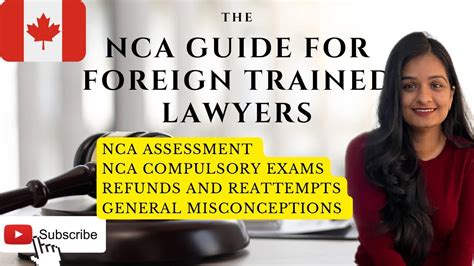Navigating the complexities of the law can be daunting, especially for foreign-trained lawyers seeking to practice in a new jurisdiction. The National Committee on Accreditation (NCA) plays a crucial role in facilitating this transition for lawyers trained outside of Canada. In this article, we will delve into the NCA application process, highlighting key steps, requirements, and considerations for foreign-trained lawyers.
Understanding the NCA and Its Role
The National Committee on Accreditation (NCA) is a standing committee of the Federation of Law Societies of Canada. Its primary function is to evaluate the credentials of foreign-trained lawyers and assess their qualifications in relation to Canadian law standards. The NCA's evaluation process is designed to ensure that foreign-trained lawyers possess the necessary knowledge, skills, and competencies to practice law in Canada.
Eligibility and Requirements
To be eligible for the NCA evaluation process, foreign-trained lawyers must meet certain requirements:
- Law Degree: Hold a law degree from a recognized institution outside of Canada.
- Good Standing: Be in good standing with the law society or bar association of the jurisdiction where they were initially licensed or authorized to practice.
- Language Proficiency: Demonstrate proficiency in either English or French, as these are the official languages of Canada.
The NCA Application Process
The NCA application process involves several stages:
- Create an Account: Foreign-trained lawyers must create an online account with the NCA to initiate the application process.
- Submit Documents: Applicants must submit various documents, including their law degree, transcripts, and proof of good standing with their home jurisdiction's law society or bar association.
- Pay Fees: Applicants must pay the required fees, which currently include an initial assessment fee and a reassessment fee (if applicable).
- Evaluation: The NCA will evaluate the applicant's credentials and assess their qualifications in relation to Canadian law standards.
Assessment Outcomes and Next Steps
Following the evaluation process, the NCA will issue an assessment report outlining the applicant's strengths and weaknesses. The report may indicate one of the following outcomes:
- No Further Study Required: The applicant's qualifications meet Canadian law standards, and they may proceed to the bar admission process.
- Additional Study Required: The applicant must complete specific courses or programs to address gaps in their knowledge and skills.
- Modified Assessment: The applicant may be required to complete a modified assessment, which may involve additional exams or coursework.
Tips and Considerations for Foreign-Trained Lawyers
To ensure a smooth application process, foreign-trained lawyers should:
- Research: Thoroughly research the NCA evaluation process and requirements.
- Seek Guidance: Consult with the NCA and law societies to clarify any questions or concerns.
- Plan Ahead: Allow sufficient time for the evaluation process and potential additional study requirements.
- Stay Organized: Keep detailed records of documents, correspondence, and deadlines.
Conclusion The NCA application process is a critical step for foreign-trained lawyers seeking to practice in Canada. By understanding the eligibility requirements, application process, and potential assessment outcomes, foreign-trained lawyers can better navigate this complex process. With careful planning, organization, and perseverance, foreign-trained lawyers can successfully transition to practicing law in Canada. FAQs Q: What is the National Committee on Accreditation (NCA)?
A: The National Committee on Accreditation (NCA) is a standing committee of the Federation of Law Societies of Canada that evaluates the credentials of foreign-trained lawyers and assesses their qualifications in relation to Canadian law standards. Q: What are the eligibility requirements for the NCA evaluation process?
A: Foreign-trained lawyers must hold a law degree from a recognized institution outside of Canada, be in good standing with their home jurisdiction's law society or bar association, and demonstrate proficiency in either English or French. Q: What is the NCA application process?
A: The NCA application process involves creating an online account, submitting required documents, paying fees, and undergoing an evaluation of the applicant's credentials. Q: What are the possible assessment outcomes?
A: The NCA may issue an assessment report indicating that the applicant's qualifications meet Canadian law standards, require additional study, or require a modified assessment. Q: What tips and considerations should foreign-trained lawyers keep in mind?
A: Foreign-trained lawyers should research the NCA evaluation process, seek guidance, plan ahead, and stay organized to ensure a smooth application process.



